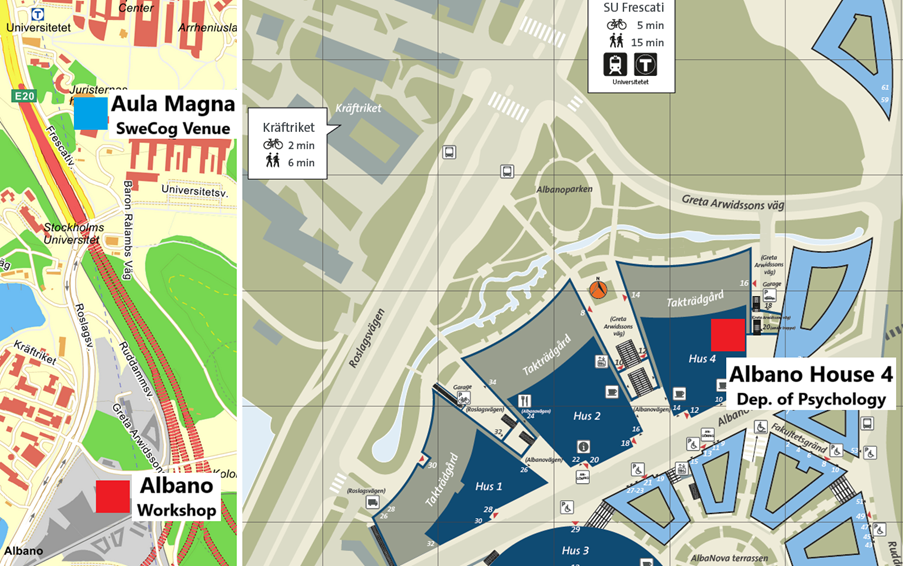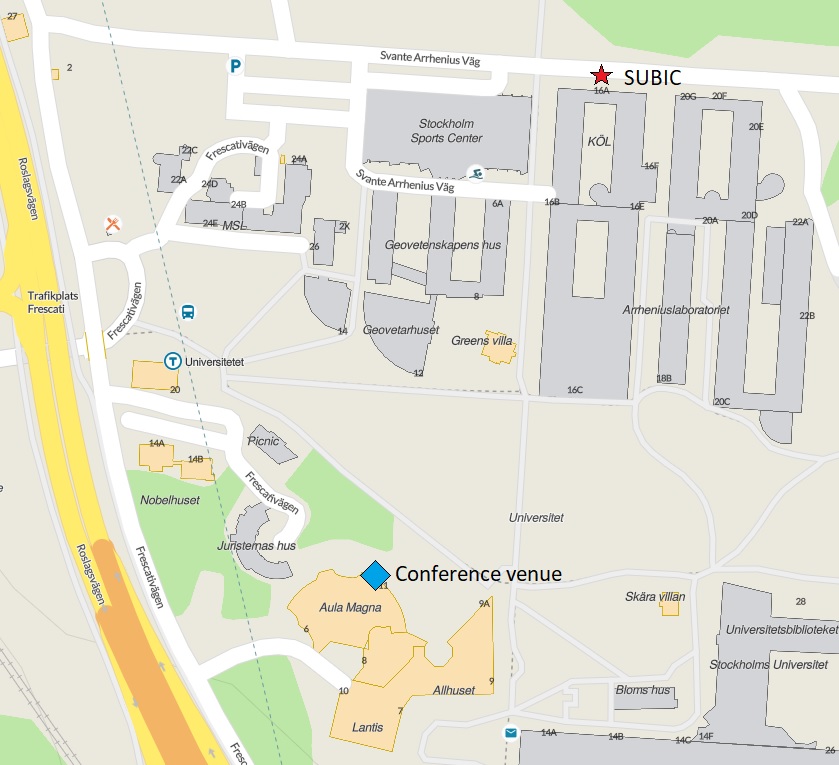SweCog 2024 - Workshops
SweCog 2024 offer three pre-conference workshops hosted in parallell on Thursday, October 10'th, 9.30 to 12.00.
Cognitive Psychology
Organisers: Maria Larsson, Mats Nilsson, Laura Ferrer-Wreder, and William Fredborg
This workshop provides an opportunity to learn about how to pursue a career in cognitive psychology research at the Department of Psychology, Stockholm University. The event begins with presentations from Laura Ferrer-Wreder, head of the Master's program, Mats Nilsson, head of the PhD program, William Fredborg, PhD student, and Maria Larsson, director of the Division of Perception & Psychophysics. In the second half, participants will have the chance to visit our laboratories and learn more about the research we do.
The workshop will take place in the meeting room Jordgubbe and the Sleep and Perception Laboratories at the Department of Psychology, Albano. To attend, please come to the waiting room outside the Psykofysiologilaboratorier in House 4, Level 3, at Albano (see the map below). The address is Albanovägen 12 (if coming from the city) or Greta Arwidssons väg 16 (if coming from the University main campus). If you get lost, please contact William Fredborg at 08-16 38 64.

Cognitive Psychology: Workshop Programme
09.00-09.30 Introduction and fika
09.30-10.30 Mentoring session: A career in cognitive psychology research
09.30-09.45 The International Master’s Program in Psychology (Laura Ferrer-Wreder)
09.45-10.00 The PhD program (Mats Nilsson)
10.00-10.15 Life as a PhD student (William Fredborg)
10.15-10.30 Research at the Department of Psychology (Maria Larsson)
10.30-12.00 Lab tour in smaller groups
The olfaction lab (Maria Larsson and William Fredborg)
The EEG-lab (Billy Gerdfeldter)
The sound lab (Malin Freidle and Mats Nilsson)
The sleep lab (John Axelsson and Elizabeth Ngan
Brain Imaging and Linguistics
Organisers: Murathan Kurfalı, Rita Almeida and Thomas Hörberg
The workshop will start with a guided tour of the Stockholm University Brain Imaging Centre (SUBIC) where the labs will be shown and participants get to know more about the brain imaging techniques used in ongoing research. Workshop participants will be divided into two groups that will take part in the two activities (visiting the brain imaging lab and a visit to the EEG lab) of the tour in opposite order.
In the second part of the workshop, we will provide an overview of language models. First, we will offer a non-technical summary of how language models work, along with a short review of the historical progress from the earliest models, such as n-gram models, to today's large language models, including the very recent o1. We will also present examples of applications of language models in various domains of cognitive science, including examples from our research on semantic memory and sensory vocabulary. We hope this presentation will inspire both students and researchers in cognitive science to leverage language models in their work.
The workshop will start in the conference room at SUBIC. The address is Svante Arrhenius väg 16 A (see attached map).

Brain Imaging and Linguistics: Workshop Programme
09.15-09.30
Introduction and division into groups
09.30-10.50
Tour of the brain imaging lab and the EEG lab in smaller groups
10.50-11.00
Coffee break
11.00-12.00
Presentation of large language models with examples
Talking Bodies in Social Robotics
Organisers: Valentina Fantasia, Ericka Johnson, and Mary Robson
Springboards:
V. Fantasia, “Embodiment, social cognition and social robots”Embodiment and participatory sense-making are two central concepts in Cognitive Science that have considered the body as central for human social cognition. Applying them to Social Robotics may help us overcoming static, individualistic and mind-centred approaches to the design and study of Human-Robot Interactions (HRI), expanding the current knowledge and research practice in this field in two ways: 1) by advancing new theoretical perspectives on how researchers conceive of robots’ and humans’ participation in social encounters, both from an ontological and a psychological perspective; 2) by offering examples of potential situations in which humans and robots may need to negotiate or coordinate meanings while interacting, lending knowledge to more ecological research design.
E. Johnson, “Robots, Bodies, Power and Theory”We are used to thinking about humans as individuals, subjects with agency and thought that comes from within… But some theories of the subject turn a focus to the contextual, the way that power dynamics and social structures afford or even produce subject positions for us to inhabit. In these approaches, the body is not only a shell for the individual, it is also a place for the power(s) of context(s) to play out and intra-act with and upon. What implications would a shift like this (from bounded individuals to subjects in co-production with context) have for HRI research that engages the bodies of relational intra-action? What new phenomena would that research make visible? What methods would one need to approach it?
Talking Bodies in Social Robotics: Workshop program
| 09:00 — 09.15 | Welcome and introduction by keynotes, by Ericka, Valentina |
| 09.15 — 09.45 | Privileged walk - what is it so be humans, by Ericka, Valentina |
| 10.00 — 10.45 | Group works - islands exercise, lead by Ericka, Mary |
| 11.00 — 11.30 | Privileged walk - what is it so be robots, by Ericka, Valentina |
| 11.40 — 12.00 | General discussion and wrap-up, lead by Ericka, Mary, Valentina |